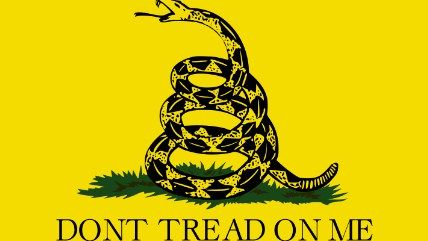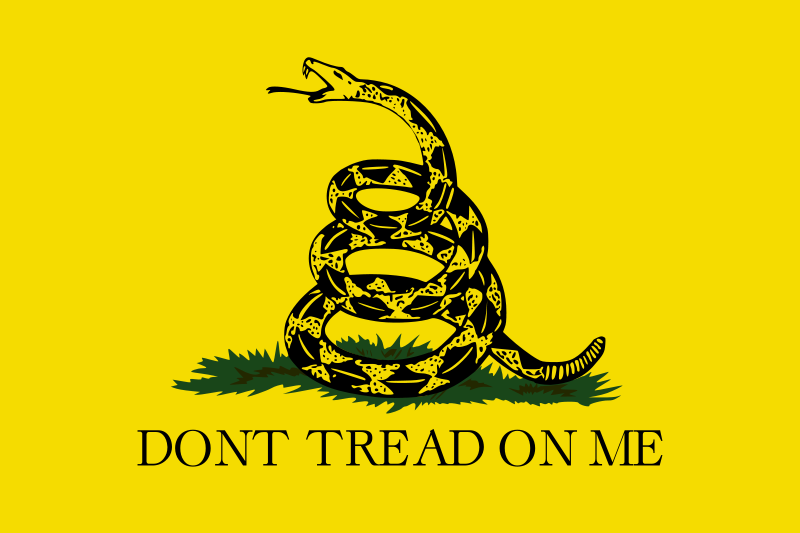When Wrongthink Becomes Workplace Harrassment
The EEOC wants to decide whether the Gadsden flag might be racist.


We are all well aware (or should be well aware) that we don't actually have "free speech" at our private workplaces. Employers can monitor employee communications and—for the sake of workplace harmony or customer relations—declare topics off subject or require employees to not curse up a storm or scream at people, et cetera, et cetera.
Inappropriate workplace speech can also constitute harassment and discrimination under federal law. Racist and sexist behavior in the workplace is forbidden and can get the employer into legal and financial hot water.
So, what happens when people decide certain symbols and political positions are themselves inherently racist and create a hostile work environment? Here's what the culture of offense has led us to. As Eugene Volokh explains over at his blog hosted by The Washington Post, the Equal Employment Opportunity Commission (EEOC) is handling a complaint by a worker at a private employer who believes the Gadsden flag with the "Don't Tread on Me" text is racist. Therefore the employee has determined that an employee wearing a hat with the Gadsden flag insignia is racial harassment.
Volokh notes that the EEOC has already ruled that wearing the Confederate flag in the workplace could potentially constitute harassment and could be punishable under federal law. The EEOC's determination is disconcerting because it acknowledges that no, the Gadsden flag is not inherently racist, and then tosses in a very significant "but still":
Complainant maintains that the Gadsden Flag is a "historical indicator of white resentment against blacks stemming largely from the Tea Party." He notes that the Vice President of the International Association of Black Professional Firefighters cited the Gadsden Flag as the equivalent of the Confederate Battle Flag when he successfully had it removed from a New Haven, Connecticut fire department flagpole.
After a thorough review of the record, it is clear that the Gadsden Flag originated in the Revolutionary War in a non-racial context. Moreover, it is clear that the flag and its slogan have been used to express various non-racial sentiments, such as when it is used in the modern Tea Party political movement, guns rights activism, patriotic displays, and by the military.
However, whatever the historic origins and meaning of the symbol, it also has since been sometimes interpreted to convey racially-tinged messages in some contexts. For example, in June 2014, assailants with connections to white supremacist groups draped the bodies of two murdered police officers with the Gadsden flag during their Las Vegas, Nevada shooting spree. …
In light of the ambiguity in the current meaning of this symbol, we find that Complainant's claim must be investigated to determine the specific context in which C1 displayed the symbol in the workplace.
So this puts the EEOC in the position where it's claiming the authority to police what sort of political symbols are permitted in the workplace depending on how much racists might have corrupted them.
This puts workplaces in the position of having to try to figure out whether its employees will interpret political speech as racist or sexist harassment. As such, the matter becomes much less about employers setting rules for appropriate workplace speech and instead being pressured to censor it in order to avoid federal intervention. Volokh notes:
Let's think about how this plays out in the workplace. Imagine that you are a reasonable employer. You don't want to restrict employee speech any more than is necessary, but you also don't want to face the risk of legal liability for allowing speech that the government might label "harassing." An employee comes to you, complaining that a coworker's wearing a "Don't Tread on Me" cap — or having an "All Lives Matter" bumper sticker on a car parked in the employee lot, or "Stop Illegal Immigration" sign on the coworker's cubicle wall — constitutes legally actionable "hostile environment harassment," in violation of federal employment law. The employee claims that in "the specific context" (perhaps based on what has been in the news, or based on what other employees have been saying in lunchroom conversations), this speech is "racially tinged" or "racially insensitive."
Would you feel pressured, by the risk of a lawsuit and of liability, into suppressing speech that expresses such viewpoints? Or would you say, "Nope, I'm not worried about the possibility of liability, I'll let my employees keep talking"? (Again, the question isn't what you may do as a matter of your own judgment about how you would control a private workplace; the question is whether the government is pressuring you to suppress speech that conveys certain viewpoints.)
Furthermore, given a presidential campaign tinged with racial and ethnic animus, Volokh worries that a worker showing support for Donald Trump, whether through bumper stickers or speech, could create a workplace liability. It's not unusual for workplaces to forbid campaign signs or other partisan symbols for the reason of maintaining workplace harmony. But here, the EEOC is giving the suggestion that political positions and endorsements that an employee feels are racist could result in a federal discrimination or harassment claim. And thus, the federal government is able to push political censorship into private work environments.
Read more about the case from Volokh here.


Show Comments (112)